new posts in all blogs
Viewing: Blog Posts Tagged with: absent blogging, Most Recent at Top [Help]
Results 26 - 50 of 50
How to use this Page
You are viewing the most recent posts tagged with the words: absent blogging in the JacketFlap blog reader. What is a tag? Think of a tag as a keyword or category label. Tags can both help you find posts on JacketFlap.com as well as provide an easy way for you to "remember" and classify posts for later recall. Try adding a tag yourself by clicking "Add a tag" below a post's header. Scroll down through the list of Recent Posts in the left column and click on a post title that sounds interesting. You can view all posts from a specific blog by clicking the Blog name in the right column, or you can click a 'More Posts from this Blog' link in any individual post.
Hercule Poirot's Christmas. Agatha Christie. 1938/1939. Black Dog & Leventhal. 272 pages.
Stephen pulled up the collar of his coat as he walked briskly along the platform.Christmas can be stressful for families--especially unhappy families. For one family, the holidays led to quite a few heated arguments and a very violent death. But which of the family did the old man in?
Simeon Lee, the victim, was a MEAN old man who didn't always treat his children right. (And he never, ever treated his wife right.) And perhaps some of the grown children should have been suspicious when their father invited them for a big family Christmas get-together. After all, he wasn't one for being sociable and nice and loving and happy. But could anyone really have predicted that someone wanted him dead?
Hercule Poirot has his opinions on the crime...and readers are in for a treat with this one.
While this wouldn't be my favorite Agatha Christie, while it wouldn't be my favorite Poirot novel, I did enjoy reading this one!
"The character of the victim has always something to do with his or her murder. The frank and unsuspicious mind of Desdemona was the direct cause of her death. A more suspicious woman would have seen Iago's machinations and circumvented them much earlier. The uncleanness of Morat directly invited his end in a bath. From the temper of Mercutio's mind came his death at the sword's point." (125-126)
"If a human being converses much, it is impossible for him to avoid the truth." (148)
© 2011 Becky Laney of
Becky's Book Reviews
Dumb Witness. Agatha Christie. 1937. HarperCollins. 320 pages.
Miss Arundell died on May 1st.Dare I say it? I think I like Hercule Poirot! I always always thought I'd prefer Miss Marple to Poirot. And maybe I've just been finding exceptions the past few reads, or maybe I'm just REALLY in a mood for Christie, but I just LOVED Dumb Witness!!! It just felt so right when I was reading it.
So Hercule Poirot receives a letter from an old woman, a potential client. She suspects someone in her family--one of her nieces or nephews, or perhaps it's great-nephews and great-nieces?--of trying to kill her. There is something about her accident--her tumble down the stairs in the middle of the night--that doesn't feel right at all.
Circumstances being what they are, this letter isn't mailed until after Miss Emily Arundell has died. Did the would-be murderer try again? Or was her death by natural causes after all? Or are there two murderers in the family? Hercule Poirot could walk away from the case, his client is dead, but if he did....he wouldn't be Hercule Poirot!
I love Agatha Christie. I really enjoyed this one!
© 2011 Becky Laney of
Becky's Book Reviews

 Murder on the Orient Express: A Hercule Poirot Mystery Agatha Christie
Murder on the Orient Express: A Hercule Poirot Mystery Agatha Christie
In case you aren't familiar with the basic plot, Poirot is on a train from Istanbul to Paris when the train gets stopped in Yugoslavia by snow on the tracks. There's a murder and they don't want to bring in the Yugoslav police (commies!) until they've already solved it. Poirot quickly determines that most of the passengers are all connected with a crime that took place in the US many years ago (and not at all based on the Lindbergh baby).
I like the twist on the contained environment, but you don't get a sense of the claustrophobia that must have been there-- train cars stuck in snow with murder? There should have been more tension, but that's not Christie's style. What I find most ingenious about Christie's work isn't how her detectives solve the crimes but rather in ingenuity of her criminals. Poirot just kinda sits back and thinks through details only he's noticed. But the real genius of Christie is how intricate the murder plots are.
Book Provided by... my local library for my Kindle!
Links to Amazon are an affiliate link. You can help support Biblio File by purchasing any item (not just the one linked to!) through these links. Read my full disclosure statement.
HarperCollins is publishing a collection of letters and photographs by Agatha Christie from a year long trip around the world in a new book published next year.
The publisher signed a worldwide deal with Christie's estate to release The Grand Tour in April 2012. The book will be edited and introduced by Christie's grandson, Matthew Pritchard.
read more
A Pocket Full of Rye. Agatha Christie. 1953. 256 pages.
I really enjoyed this Miss Marple mystery. I'm not sure what more I can add to that. I mean, it's a mystery. A mystery with multiple victims. A mystery that kept me guessing until the very end--or close to it.
I always enjoy Miss Marple, she's such a delightful character. And I enjoyed this Miss Marple mystery very much. I wouldn't say it is my favorite and best Marple--but it's certainly worth a read or reread!!!
The first victim, Rex Fortescue, is a business man who dies in his office after drinking his tea. They're almost positive he was murdered--poisoned. But they're also positive the poison was not in the tea. Someone in his family--someone close to him--murdered him. But can they figure out just who the murderer is?
One puzzling clue--you may have guessed it--is a pocket full of rye in his pocket. But that's just one of many puzzling clues that abound in this novel!
I definitely liked this one!
© 2011 Becky Laney of
Becky's Book Reviews
A Murder on the Links. Agatha Christie. 1923. 272 pages.
I just LOVED, LOVED, LOVED this mystery novel starring Hercule Poirot and his close friend Arthur Hastings. The novel, I believe, is narrated by Hastings, the same narrator introduced in Poirot's first novel, The Mysterious Affair At Styles.
I usually find Christie's Miss Marple novels to be more delightful, more charming, more satisfying than those starring Hercule Poirot. But this one is definitely an exception. I just loved it from cover to cover.
This mystery, for the most part, occurs in France. And it just works really, really well. I don't want to say too much about the mystery itself. I mean the less you know the better...but you really should give Agatha Christie a try!
© 2011 Becky Laney of
Becky's Book Reviews

By:
Becky Laney,
on 8/5/2011
Blog:
Becky's Book Reviews
(
Login to Add to MyJacketFlap)
JacketFlap tags:
1952,
Agatha Christie,
2011,
Miss Marple,
library book,
adult mystery,
HarperCollins,
adult fiction,
mystery,
Add a tag
They Do It With Mirrors. (Miss Marple). Agatha Christie. 1952/2011. HarperCollins 224 pages.
Mrs. Van Rydock moved a little back from the mirror and sighed. Ruth Van Rydock wants her good friend, Jane Marple, to do her a favor. She's worried about their mutual friend Carrie Louise Serrocold. She has a feeling that Carrie Louise is in trouble or in danger. And so she's arranged a visit for Miss Marple. After a few small lies are told to smooth the way, Carrie Louise is happy to welcome her old friend into her home. Miss Marple is introduced to the STRANGE, STRANGE bunch of folks living or working on the estate. Her husband, Lewis. Her daughter, Mildred. Her granddaughter, Gina, and her husband, Walter. Her stepsons from her second marriage, Stephen and Alex Restarick. Her companion-caretaker, Juliet Bellever. Her husband's assistant, Edgar Lawson. (Carrie Louise has been married three times--and it shows. She's carried over wealth and property, but, also children and grandchildren, etc.) Her husband's pet project has him working with juvenile delinquents with part of the estate being converted into a school of sorts. I won't lie, it was a bit confusing at first to see how these characters connect to one another--if they connect to one another. It helps that almost every character seeks out Miss Marple in the days after her arrival. One by one they "unburden" themselves and complain freely about anything and everything.
Of course, it turns out that Ruth had VERY good reason to worry about her friend. And Miss Marple it seems arrived just in time for the drama. Soon there's a murder to be solved...can she solve it in time before more lives are lost?
I enjoy Miss Marple. I do. There is just something satisfying about reading Agatha Christie. While They Do It With Murders isn't my new favorite or anything, it is an enjoyable mystery. Not perfect. But definitely enjoyable enough to recommend.
Ruth to Miss Marple:
"You've always been a sweet innocent looking creature, Jane, and all the time underneath nothing has ever surprised you, you always believe the worst."
"The worst is so often true," murmured Miss Marple.
"Why you have such a poor idea of human nature, I can't think--living in that sweet peaceful village of yours, so old world and pure."
"You have never lived in a village, Ruth. The things that go on in a pure peaceful village would probably surprise you."
"Oh I daresay. My point is that they don't surprise you." (9)
Inspector Curry and Miss Marple:
"This is all very distressing I know. But we've just got to get the facts clear. Get it all clear."
"Oh yes, I know," said Miss Marple. "So difficult, isn't it? To be clear about anything, I mean. Because if you're looking at one thing, you can't be looking at another. And one so often looks at the wrong thing, though whether because one happens to do so or because you're meant to, it's very hard to say. Misdirection, the conjurers call it. So clever, aren't they?" (90)
© 2011 Becky Laney of
Becky's Book Reviews
Elephants Can Remember. Agatha Christie. (Hercule Poirot). 1972. 212 pages.
Mrs. Oliver looked at herself in the glass. While I tend to prefer Miss Marple to Hercule Poirot most of the time, when Christie's Poirot novels feature Ariadne Oliver, it becomes trickier to play favorites. For Ariadne Oliver is a writer, a writer of detective fiction or mysteries. And her perspective on the genre--and on writing in general--which is shared with readers is just fun. In Elephants Can Remember, Mrs. Oliver is approached by a woman who is memorable for all the wrong reasons:
A large woman. Ample proportions, large white champing teeth. What in French could have been called une femme formidable, but who definitely had not only the French variety of being formidable, but the English one of being supremely bossy. Obviously she either knew Mrs. Oliver, or was intent on making her acquaintance there and then. The last was how it happened to go. (8)
Mrs. Burton-Cox is "concerned" about her son who is contemplating marrying Mrs. Oliver's goddaughter. Now, Mrs. Oliver has had many goddaughters through the decades, and this particular one has slipped her mind completely. Well, until forced to remember by Burton-Cox's persistence. Celia Ravenscroft is the goddaughter in question, the "inappropriate" young woman, that Burton-Cox does not want for her daughter-in-law. Why? Well, there was a family tragedy when Celia was just a girl. Her parents died in an apparent suicide. No one knows if her father shot her mother or if her mother shot her father. No one knows what provoked this murder-suicide. Was her mother involved with another man? Was her father involved with another woman? And though it seems almost everyone has forgotten this tragedy except Mrs. Burton-Cox, she's convinced that Celia is not good for her son.
Mrs. Oliver is annoyed by Mrs. Burton-Cox. But she is also curious. She was out of the country when the tragedy happened all those years ago, and, well, part of her wants to know the truth--or as much of the truth can be discerned or concluded--herself. So she decides that if Celia will give her blessing, she'll begin to snoop around. And she'll even call her old friend, Hercule Poirot. He may be able to connect the dots and solve this one.
I enjoyed this one. I did. I don't know that it is my favorite Agatha Christie, but it is a good read.
Favorite quote:
"Human curiosity," said Poirot. "Such a very interesting thing." He sighed. "To think that we owe to it throughout history. Curiosity. I don't know who invented curiosity. It is said to be usually associated with the cat. Curiosity killed the cat. But I should say really that the Greeks were the inventors of curiosity. They wanted to know. Before them, as far as I can see, nobody wanted to know much. They just wanted to know what the rules of the country they were living in were, and how they could avoid having their heads cut off or being impaled on spikes or something disagreeable happening to them. But they either obeyed or disobeyed. They didn't want to know why. But since then a lot of people have wanted to know why and all sorts of things have happened because of that. Boats, trains, flying machines and atom bombs and penicillin and cures for various illnesses. A little boy watches his mother's kettle raising its lid because of the steam. And the next thing we know is we have railway trains, leading on in due course to railway strikes and all that. And so on and so on." (25)
"As one journeys through life," said Poirot, "one finds more and more that people are often interested in things that are none of their business. Even mor
Dead Man's Folly. Agatha Christie. 1956/2000. Penguin. 240 pages.
It was Miss Lemon, Poirot's efficient secretary, who took the telephone call. Hercule Poirot is coming to the aid of his friend Ariadne Oliver. This mystery writer is planning a fun weekend game of mock murder. But days away from the big event, she's getting this uncomfortable feeling. Her instincts are telling her that something is wrong. She's not sure exactly what is wrong. But she feels the need for Poirot. And he's happy to help--happy to show off, perhaps?
Dead Man's Folly has an interesting cast of characters. And I enjoyed reading this one. Christie has a wonderful gift with characterization--each man and woman so complex, so layered. And it's always interesting to see how her stories unfold. To see how the clues unfold. There are plenty of clues--true and false--in this one.
I liked this one. It was a compelling read. I am so happy I discovered Agatha Christie this year!
"The fatal flaw, eh?" he remarked.
"That's just it," said Mrs. Oliver. "There always is one. Sometimes one doesn't realize it until a book's actually in print. And then it's agony!" Her face reflected this emotion. She sighed. "The curious thing is that most people never notice it. I say to myself, 'But of course the cook would have been bound to notice that two cutlets hadn't been eaten.' But nobody else thinks of it at all." (56)
It would be difficult, Bland thought, to forget Hercule Poirot, and this not entirely for complimentary reasons. (101)
"What can you say about how you write books? What I mean is, first you've got to think of something, and when you've thought of it you've got to force yourself to sit down and write it. That's all. It would have taken me just three minutes to explain that, and then the Talk would have been ended and everyone would have been very fed up. I can't imagine why everybody is always so keen for authors to talk about writing. I should have thought it was an author's business to write, not talk." (209)
© 2011 Becky Laney of
Becky's Book Reviews
The Big Four. Agatha Christie. 1927/2001. Penguin. 208 pages.
I have met people who enjoy a channel crossing; men who can sit calmly in their deck-chairs and, on arrival, wait until the boat is moored, then gather their belongings together without fuss and disembark.Captain Hastings narrates this Hercule Poirot novel. First, I must say that it was GREAT to have him back as narrator. I'd missed him lately. Second, I must say that this Hercule Poirot is very different from others I've read. There is a big mystery to be solved. And there are plenty of little mysteries to be solved. The motives for these crimes are very different. More political, more conspiracy theory, more intellectual intrigue than the traditional murder mystery.
Who are the Big Four? Well, Poirot believes them to be a secret organization running the world behind the scenes. The masterminds behind several political upheavals. One from China. One from France. One from the United States. And the fourth, well, that's the mystery. For this "destroyer" is the most elusive of them all. An expert at disguise he certainly must be. For Hastings and Poirot believe they've encountered him at many, many of their recent crime scenes. But no matter how many times they catch a glimpse, they're never able to describe him.
At the beginning, they've only got a lead on the identity of one of the members. But they're hoping to find all four so they can be brought to justice. For the bodies do begin to pile up in this one--and each one gives them a little clue. It won't be an easy case to solve--for it's all a game with traps hidden within traps within traps. But if anyone can solve it, Poirot's the man for the job.
I liked this one. I didn't love it exactly. But it was a good read, a compelling one!
© 2011 Becky Laney of
Becky's Book Reviews
A Caribbean Mystery. Agatha Christie. 1964/2007. Black Dog & Leventhal. 256 pages.
"Take all this business about Kenya," said Major Palgrave. Miss Marple is on vacation. And, for the most part, she's enjoying herself. Enjoying getting to know the other people staying at the resort owned by a husband and wife, Tim and Molly Kendal. When the novel opens, she is listening--or pretending to listen--to Major Palgrave. Little knowing that within twenty-four hours this man will be dead. Did he die because he talked too much? Could one of his stories have led to his death? Maybe. Miss Marple will have to investigate to know for sure. But she suspects that his story about having a snapshot of a murderer might be to blame. Since this snapshot is not found after his death.
I enjoyed this one. I wouldn't say it is my absolute favorite Miss Marple--I don't know that I could really choose just one for that. But it was certainly enjoyable! I enjoyed the unfolding mystery of this one. I enjoyed the characters. I enjoyed the setting. I enjoyed the dialogue! It was a fun read!
Miss Marple woke early. Like many old people, she slept lightly and had periods of wakefulness which she used for the planning of some action or actions to be carried out on the next or following days. Usually, of course, these were of a wholly private or domestic nature, of little interest to anybody but herself. But this morning Miss Marple lay thinking soberly and constructively of murder, and what, if her suspicions were correct, she would do about it. It wasn't going to be easy. She had one weapon and one weapon only--and that was conversation.
Old ladies were given to a good deal of rambling conversation. People were bored by this, but certainly did not suspect them of ulterior motives. It would not be a case of asking direct questions. (Indeed, she would have found it difficult to know what questions to ask!) It would be a question of finding out a little more about certain people. (46)
"Conversations with you might be dangerous," he said.
"Conversations are always dangerous, if you have something to hide," said Miss Marple. (142)
"I've been wrong about her," said Mr. Rafiel with characteristic frankness. "Never been much of a one for the old pussies. All knitting wool and tittle-tattle. But this one's got something. Eyes and ears, and she uses them." (148)
© 2011 Becky Laney of
Becky's Book Reviews
And Then There Were None. Agatha Christie. 1939/2000. Buccaneer Books. 192 pages.
In the corner of a first-class smoking carriage, Mr. Justice Wargrave, lately retired from the bench, puffed at a cigar and ran an interesting eye through the political news in the Times. He laid the paper down and glanced out of the window. They were running now through Somerset. He glanced at his watch--another two hours to go.Ten men and women arrive on Indian island never suspecting the dangers and thrills that are to come. None will leave the island alive. Mr. Justice Wargrave, Vera Claythorne, Captain Philip Lombard, Emily Brent, General MacArthur, Dr. Armstrong, Anthony Marston, Mr. Blore, Mr. and Mrs. Rogers. It seems each has been lured to the island without really knowing their host or hostess. Mr. and Mrs. Rogers being engaged as servants. Miss Vera Claythorne being engaged as a temporary secretary. The others all received letters of invitation. It soon becomes clear that not everything is as it appears.
There are some not-so-hidden clues embodied within a nursery rhyme poem, "Ten Little Indians" (found on pages 21-22 of my edition; you can get an idea of it
from this site, though it's not an easy read, it seems it's a combination of two poems, one from 1868 and the other from 1869). There are also ten little figurines--as each guest dies, a figurine from the table vanishes as well.
Readers get a chance to learn a little about each character. Especially the ones that survive the first few deadly days. None of the characters are particularly likable--none so delightful that you'd want to know them--especially not under
these circumstances.
I would say this Christie novel comes the closest to inspiring fear and horror in its readers. There isn't anything particularly cozy or delightful or charming about this one. There are no clever detectives--arrogant or not--to counterbalance the violence. Almost everything that I love about Christie's mysteries seems to be missing in this one. But even though I don't especially "like" this one, I can't deny that it was cleverly written.
© 2011 Becky Laney of
Becky's Book Reviews
Cat Among the Pigeons. Agatha Christie. 1959/2007. Black Dog & Leventhal. 272 pages.
It was the opening day of the summer term at Meadowbank school.Set at a girls' boarding school, this Hercule Poirot mystery was oh-so-fascinating. I enjoyed it so much! It's a mystery novel with plenty of narrators--from teachers and secretaries to students. This school term is unlike previous terms--for one of the new students brings mystery and danger to the prestigious school. And this "danger" will cost a few teachers their lives. A quick-thinking student, Julia Upjohn, decides to seek out Hercule Poirot believing that this detective is the man for the job. If anyone can stop this murderer and solve the mystery, he can.
I loved this one. I loved how this mystery unfolds. How Hercule Poirot does not enter into the book too early. How other characters are given the opportunity to shine. So when he does appear, I almost felt like cheering. (I wasn't expecting that!) I am still loving Agatha Christie. I'm still finding her novels clever and wonderful and oh-so-compelling. There is just something so delightful, so satisfying about reading her books!
© 2011 Becky Laney of
Becky's Book Reviews
At Bertram's Hotel. Agatha Christie. 1965/2007. Black Dog & Leventhal. 272 pages.
In the heart of the West End, there are many quiet pockets, unknown to almost all but taxi drivers who traverse them with expert knowledge, and arrive triumphantly thereby at Park Lane, Berkeley Square, or South Audley Street.Is Bertram's Hotel too good to be true? Miss Marple senses something is not as it should be. She senses that there is something unreal about this place. It's in the little things, really, and it's hard to put into words almost. But the hotel seems more like an act, a show, a theatrical production, than a proper hotel. Miss Marple is on vacation in London. And she's as observant as ever--which proves useful as a mystery begins to unfold concerning the hotel and its guests. (One guest ends up missing! One clerk ends up dead!) The novel focuses on a broken relationship between mother and daughter and the race car driver that may just come between them in the end.
Though it stars Miss Marple--a character I've come to love and adore--I did not love and adore At Bertram's Hotel. I found it confusing. The shifts in narration. The introduction of new characters, new stories, new mysteries. It felt so chaotic, so unconnected. I knew if I kept reading, it would make sense in the end. I knew that all these elements would come together nicely. That Miss Marple would be Miss Marple and all would be right with the world. And I was right. I did find it compelling by the end. Still. I was a little disappointed that it wasn't love through and through.
Miss Marple seldom gave anyone the benefit of the doubt; she invariably thought the worst, and nine times out of ten, so she insisted, she was right in so doing. (119)
"I learned (what I suppose I really knew already) that one can never go back, that one should not ever try to go back--that the essence of life is going forward. Life is really a one way street, isn't it?" (194)
© 2011 Becky Laney of
Becky's Book Reviews
Appointment with Death. Agatha Christie. 1937/2007. Black Dog & Leventhal. 256 pages.
"You do see, don't you, that she's got to be killed?" The question floated out into the still night air, seemed to hang there a moment and then drift away down into the darkness towards the Dead Sea. Hercule Poirot paused a minute with his hand on the window catch.Hercule Poirot is vacationing in Jerusalem when he overhears a private conversation. A man and woman discussing murder quite matter-of-factly. Who are they wanting to murder? Their stepmother. Is their stepmother really wicked? Well, many fellow vacationers seem to think so! She's a mean bully. A cruel tyrant. A woman almost impossible to love, to pity. She "manages" her adult children through fear and manipulation. Though alive, they appear lifeless. This 'strange' American family catches the interest of several fellow travelers including Miss Sarah King and Dr. Theodore Gerard. The family inspires pity--for the most part--and discussion. In just a few short days, this family becomes THE topic of discussion wherever they go--first in Jerusalem, and later in Petra. But when this matriarch, Mrs. Boynton, dies Poirot recalls this conversation. And that, along with a puncture wound on the wrist, becomes enough to interrogate this family and investigate this death. Can he come to the truth in just 24 hours? Even if he discovers the truth, will there be enough evidence to bring to convict should it ever go to trial?
I didn't love this one. It was more like than love. I found it compelling enough to finish. I thought it got off to a nice start--with its reference to Anthony Trollope, it had me hooked actually. But it doesn't do that well when compared to the other Christie mysteries I've read so far. Still, I'm glad I've read it.
© 2011 Becky Laney of
Becky's Book Reviews

The classic science fiction author Jules Verne received his own Google Doodle today–U.S. readers will see an that image of the Twenty Thousand Leagues Under the Sea submarine portholes as they search with Google.
Verne was born on this date in 1828. Today hAccording to UNESCO’s Index Translationum database, Verne is the third most translated author in the world–only topped by Walt Disney and Agatha Christie.
Other Google Doodles have honored Jane Austen Oscar Wilde, Agatha Christie, and Ahmad Shawqi. (Via Publishers Weekly)
New Career Opportunities Daily: The best jobs in media.
Cards on the Table. Agatha Christie. 1937. Penguin. 224 pages.
"My dear Monsieur Poirot!" I loved this one. I just loved, loved, loved this one. In this Hercule Poirot mystery, we meet four sleuths and four criminals. They are brought together by a strange man who loves to collect things, Mr. Shaitana. He boasts one day that he'll be happy to exhibit for his friend, Hercule Poirot, his collection of murderers--men and women who have all gotten away with murder. He suggests an evening of entertainment. The guests (of sleuths) include Hercule Poirot, Ariadne Oliver, Colonel Race, and Superintendent Battle. My favorite of the new characters is Ariadne Oliver, a mystery writer. The four (potential) criminals are Dr. Roberts, Mrs. Lorrimer, Miss Meredith, and Major Despard. Of course, Shaitana doesn't tell his guests his purpose, his plan. Only Poirot knows the reason behind the night's festivities. Two bridge games in two different rooms. Mr. Shaitana is enjoying a cozy night in front of the fire, until, he isn't! For he's murdered! The four guests say that no one entered the room. So it isn't hard to conclude that one of his guests murdered him. But who was it?
These four sleuths decide to work together to solve the crime. Each will interview the suspects. Each will go about it in their own way. (Each has their own method, their own philosophy, their own contacts.) It's fine to keep their own conclusions secret, but all the clues are supposed to be shared with one another. All their cards are to be on the table, so to speak. Readers get to see glimpses of each of these sleuths at work. Through dialogue, we get to know each sleuth, each criminal a little bit better. And I must say it makes for a compelling read! This one was impossible to put down!
I definitely consider this Hercule Poirot to be among my favorite and best. I really enjoyed so many things about it!
Here are a few of my favorite quotes:
"Ask Doctor Roberts if he'll be so good as to step this way."
"I should have kept him to the end," said Mrs. Oliver.
"In a book I mean," she added apologetically.
"Real life's a bit different," said Battle.
"I know," said Mrs. Oliver. "Badly constructed." (25)
"Man is an unoriginal animal," said Hercule Poirot.
"Women," said Mrs. Oliver, "are capable of infinite variation. I should never commit the same type of murder twice running."
"Don't you ever write the same plot twice running?" asked Battle.
"The Lotus Murder," murmured Poirot. "The Clue of the Candle Wax."
Mrs. Oliver turned on him, her eyes beaming appreciation.
"That's clever of you--that's really very clever of you. Because of course those two are exactly the same plot, but nobody else has seen it." (54)
"You are an extraordinary man, Monsieur Poirot."
"I am as the good God made me, Madame."
"We are all that, I suppose."
"Not all, Madame. Some of us have tried to improve on his pattern." (79-80)
"We all make mistakes, Monsieur Poirot."
"Some of us," said Poirot with a certain coldness possibly due to the pronoun the other had used, "make less than others."
Despard looked at him, smiled slightly and said:
"Don't you ever have a failure, Monsieur Poirot?"
"The last time was twenty-eight years ago," said Poirot with dignity. "And even then, there were circumstances--but no matter." (106)
© 2011 Becky Laney of
Becky's Book Reviews
Murder on the Orient Express. Agatha Christie. 1933/2006. Black Dog & Leventhal. 272 pages.
It was five o'clock on a winter's morning in Syria. Alongside the platform at Aleppo stood the train grandly designated in railway guides as the Taurus Express. It consisted of a kitchen and a dining car, a sleeping car and two local coaches.Murder on the Orient Express is my second Agatha Christie. It stars Inspector Hercule Poirot. The murder occurs in the middle of a night on a train--as you probably know already. The train becomes snowbound, and it is up to Hercule Poirot, one of the passengers, to solve the crime. (The murderer has to still be on board.) After examining the crime scene for clues, he interviews each of the passengers one by one: Mary Debenham, Colonel Arbuthnot, Hector MacQueen, Antonio Foscarelli, Edward Henry Masterman, Cyrus Hardman, Princess Dragomiroff, Greta Ohlsson, Mrs. Hubbard, Hildegarde Schmidt, Count and Countess Andrenyi. What clues did the murderer leave behind him/her? Which passenger has the greatest motive for wanting M. Ratchett dead?
I really loved this one. It was so compelling, so suspenseful. I loved the way this one was told, loved the way we got to know the suspects. And, of course, I loved Hercule Poirot. I would definitely recommend this one.
"Madame," Poirot waved an airy hand, "detectives have to ask all sorts of questions. For instance, perhaps you will tell me the colour of your dressing gown?"
She stared at him. Then she laughed. "It is corn-coloured chiffon. Is that really important?"
"Very important, Madame."
She asked curiously: "Are you really a detective, then?"
"At your service, Madame."
"I thought there were no detectives on the train when it passed through Jugo-Slavia--not until one got to Italy."
"I am not a Jugo-Slavian detective, Madame. I am an international detective."
"You belong to the League of Nations?"
"I belong to the world, Madame." said Poirot dramatically. He went on: "I work mainly in London. You speak English?" he added in that language. (128)
© 2011 Becky Laney of
Becky's Book Reviews
The Mysterious Affair At Styles. A Hercule Poirot Mystery. Agatha Christie. 1920/2006. Black Dog & Leventhal. 224 pages.
The intense interest aroused in the public by what was known at the time as "The Styles Case" has now somewhat subsided. Nevertheless, in view of the worldwide notoriety which attended it, I have been asked, both by my friend Poirot and the family themselves, to write an account of the whole story. This, we trust, will effectually silence the sensational rumours which still persist.The Mysterious Affair at Styles was Agatha Christie's first novel. And since I'm new to her work--new to the genre--I thought I would start at the very beginning.
Hastings, our narrator, is a guest at Styles Court. He finds himself in a bit of a mess. You see, the family is at odds with one another. The (step)mother, Mrs. Emily Inglethorp, has recently remarried a much younger man. And John and Lawrence, the sons, are UNHAPPY. They think she is being used. They think it likely that their inheritance is at risk by this new husband. John has problems of his own--marital problems. Hastings hears it all--for better or worse. He's even warned of the danger Mrs. Inglethorp faces. So when she is found dead--in her locked bedroom--well, Hastings, is one of many anxious to solve this mystery. He calls his friend Hercule Poirot to investigate the crime...
I enjoyed this one very much. I liked the narrator, Hastings. I liked how Hercule Poirot kept him guessing. Hastings--for the most part--was there by Poirot's side during the investigation. And he had more than a few private conversations with Poirot. Conversations about who the murderer was--or who they thought the murderer was. Yet. Hastings isn't able to piece this one together. He, like the reader perhaps, is kept guessing until the big reveal. As for the detective, I really enjoyed Hercule Poirot. I did. I liked the way this story unfolded chapter by chapter. Each chapter reveals a few clues. Each chapter leads you in a certain direction. I thought it was well done. I found it very compelling!
I would definitely recommend this one!
© 2011 Becky Laney of
Becky's Book Reviews


The Google Doodle team honored two writers in select countries last Friday. Oscar Wilde received a mysterious Dorian Gray-style doodle in honor of his 156th birthday. The Google team incorporated Arabic script into the logo to honor the birthday of poet Ahmad Shawqi (both embedded above, via).
Wilde’s most notable works include The Importance of Being Earnest and The Picture of Dorian Gray. To this day, he is widely considered to be iconic in the gay community. He passed away at age 40 in 1900 from cerebral meningitis.
Shawqi was known primarily as a poet. He was particularly known in the Arabic literature community for being the first to write poetic plays. The play which gave him the most fame and recognition was the tragedy, The Death of Cleopatra.
continued…
New Career Opportunities Daily: The best jobs in media.
 Writers have always had interesting stories beyond the ones they put down to paper. Here’s the naked truth: Neatorama has outed seven well-known authors as nudist writers.
Writers have always had interesting stories beyond the ones they put down to paper. Here’s the naked truth: Neatorama has outed seven well-known authors as nudist writers.
The authors are Victor Hugo, Ernest Hemingway, D.H. Lawrence, James Whitcomb Riley, Edmond Rostand, Benjamin Franklin, and Agatha Christie.
Hemingway’s cousin, Edward actually opened Britain’s oldest nudist colony during the 1930s and called it Metherell Towers. So far, there are no accountings of Ernest having visited the colony. Most of the authors don’t give an explanation for the unclothed state, but French novelist Hugo had a legitimate methodical purpose behind his nudeness.
Neatorama reports: “When Victor Hugo, the famous author of great tomes such as Les Misérables and The Hunchback of Notre-Dame, ran into a writer’s block, he concocted a unique scheme to force himself to write: he had his servant take all of his clothes away for the day and leave his own nude self with only pen and paper, so he’d have nothing to do but sit down and write.”
New Career Opportunities Daily: The best jobs in media.
The Murder of Roger Ackroyd: A Hercule Poirot Mystery Agatha Christie
When the richest man in town is murdered, the suspect list is long and varied. Everyone had a motive, but very few (if any) people had a way. There are marriages of convenience, heirs who have been written out of wills, affairs, black mail, and random drug-addicted relatives from America. The town doctor is our narrator and he's happy to tag along and watch his new next-door neighbor, Hercule Poirot solve the case.
I never would have guessed whodunnit except that the back says "Setting up the traditional rules of mystery only to shatter them, Christie delivers her most controversial detective novel ever, and it still startles." Which made me think in directions my mind never would have gone. My inner dialogue was a lot of "She couldn't! She wouldn't! Would she? OMG she totally did." (To not confuse you, the "she" is Christie, not a character.) I also loved the doctor's spinster sister, who is the queen of mad theories and village gossip. I think every English village has one, and her character is so perfect for the book and Poirot and Christie both use her for excellent purposes.
That said, I still loved it. I don't read a lot of mysteries, especially for adults, but I do like all the Christie I have read and I'm really glad I joined the
Marple/Poirot/Holmes challenge so I have an excuse to read at least 3 more Christie books this year!
Book Provided by... my local library
Links to Amazon are an affiliate link. You can help support Biblio File by purchasing any item (not just the one linked to!) through these links. Read my full disclosure statement.
By: Elizabeth,
on 4/7/2009
Blog:
Underage Reading
(
Login to Add to MyJacketFlap)
JacketFlap tags:
buffy,
twilight,
joss whedon,
Vampire Academy,
Twilight series,
Evernight,
agatha christie,
claudia gray,
I learned it from Joss Whedon,
Meyer, Stephenie,
Flawed, however, can indeed coincide with uninteresting,
Gray, Claudia,
Mead, Richelle,
Vampire Academy series,
amy vincent,
dropped plot points,
gratuitous spoilers,
the murder of roger ackroyd,
Add a tag

It looks kind of gothic and cool.
It is not.
EVERNIGHT, by Claudia Gray (the pen name, evidently, of someone named Amy Vincent), was highly disappointing.
For starters, it opened with exactly the kind of prologue I find most off-putting, namely, one that seems to exist only because otherwise the first several chapters will be too boring, so the author wants to assure us that something suspenseful is going to happen later on. The problem? I don’t usually feel any suspense during action sequences unless I’m already invested in the characters, which, almost by definition, I’m not by the time of a prologue. I gathered from EVERNIGHT’s prologue that someone would wind up in some danger and feeling some guilty anguish, but nothing made me really care.
But I’d heard good things, so on I went to the actual book. Throughout the early chapters, I kept trying to like it, and almost managing. I thought the premise — a school for vampires suddenly opens itself to human students — had definite potential. Character-wise, Gray did something I really liked:
It’s funny–when people call you “shy,” they usually smile. Like it’s cute, some funny little habit you’ll grow out of when you’re older, like the gaps in your grin when your baby teeth fall out. If they knew how it felt–really being shy, not just unsure at first–they wouldn’t smile. Not if they knew how the feeling knots up your stomach or makes your palms sweat or robs you of the ability to say anything that makes sense. It’s not cute at all.
–but then undermined it by never having her character actually think or act like a shy person, just telling us a lot of times that she was. I felt like I would’ve wanted to read the book Gray told us she was writing.
On a sentence level, EVERNIGHT vacillated between incredibly pedestrian, generic prose and the sort of quintessentially young adult cadence I really like, where really long and really short clauses mix together; you can see all of this in this short paragraph from early on:
Until that moment, I hadn’t known what fear was. Shock jolted through me, cold as ice water, and I found out just how fast I could really run. I didn’t scream–there was no point, none, because I’d gone off into the woods so nobody could find me, which was the dumbest thing I’d ever done and looked like it would be the last. [...] I had to run like hell.
There was also a lot of sloppiness on little details (like, no one in high school is old enough to drink legally!), which was distracting, but I dutifully moved along in the book, waiting for the plot to develop. And then it did, and I was sorry.
(Vague but important spoilers below.)
The entire first half of the book is playing an absurd trick on the reader, which is then revealed. It’s a trick in the tradition of Agatha Christie’s THE MURDER OF ROGER ACKROYD, which I thought was very clever when I read it as an eleven-year-old; it here has the effect of just undoing any investment I had in the character I thought I was reading about. Seriously, there was absolutely no reason to have kept the crucial information from readers except for the author to revel in how “clever” the trick was, except it… really wasn’t. EVERNIGHT is trying to be “Enemies” from Season 3 of BUFFY, and ending up more in the territory of “And it was all a dream!”
And speaking of gratuitous choices, here’s my fan letter to the author:
Dear Claudia Gray,
Please don’t spoil Hitchcock movies I haven’t seen since I was a small child and don’t remember the big plot twists in, just so you can have the characters discuss them to establish that they both like old movies. Thank you,
Love,
Elizabeth
As blog readers will know, though, I can overlook a lot when I really get into a teen romance. Which is why the final straw for me was that the protagonist and her love interest are the most codependent creeps since Meyer set the trend in this genre. Seriously, our heroine Bianca goes on, and on, and on about how much the sniveling hero Lucas just wants to protect her. If I could’ve believed in these characters and their allegedly undying love for one another, I would’ve been really frightened for them.
My last complaint, I swear: EVERNIGHT flagrantly violates the Chekov Rule (”If there’s a gun in the first act…”) with the most blatantly dropped plot point this side of BUFFY’s seventh season. (And by that, I do mean every damn week of season 7, but that’s no excuse; if it was real bad when Joss did it, it’s certainly no good when this lady follows suit.) It’s possible this is just setup for some sequel, but I’m sure as hell not reading any more to find out.
TWILIGHT, VAMPIRE ACADEMY, now this… Why can’t I find a damn vampire romance that’s any good? In book form, that is.
Posted in Evernight, Flawed, however, can indeed coincide with uninteresting, Gray, Claudia, I learned it from Joss Whedon, Mead, Richelle, Meyer, Stephenie, Twilight series, Vampire Academy series






 The A.B.C. Murders
The A.B.C. Murders
by Agatha Christie
(Penguin paperback, 1991 reissue)
Agatha Christie is my guilty pleasure, though I secretly think she's got a lot more serious stuff going on than is commonly acknowledged; if I ever go back to grad school I'll write about her sly sophistication about class conflict, ageism, xenophobia, etc. This Hercule Poirot case, involving a series of murders in alphabetical order, takes on class assumptions, the fine line between homicidal mania and just being a bit nutty, and some unexpected romance as well. Read in an afternoon, then ponder or discuss.
 A Murder Is Announced
A Murder Is Announced
by Agatha Christie (Signet paperback, 2001 reissue)
Another sign of my weakness for Christie, this mystery celebrates small town life while skewering it mercilessly. It's also yet another instance of the impossibility of guessing the culprit -- I once read Christie would write the novel almost to the end, decide who was the most unlikely suspect, then go back and "frame" that person in her edits. However she did it, it's always a treat for the lover of old-fashioned puzzles.









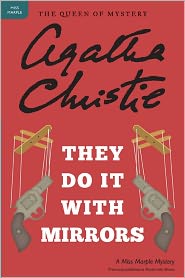

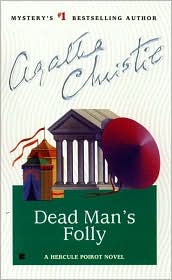
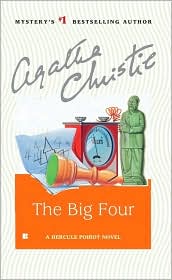
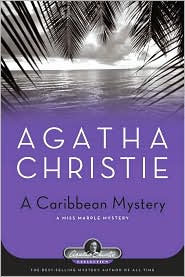


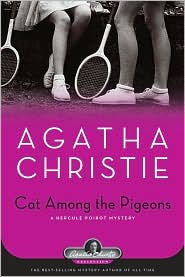
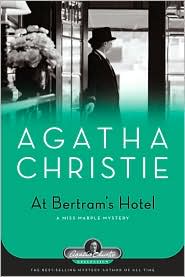
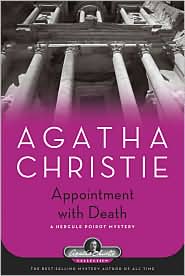

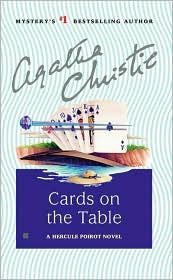
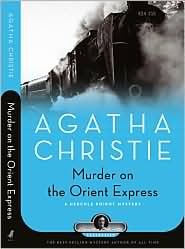
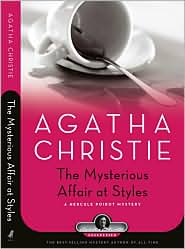


 Writers have always had interesting stories beyond the ones they put down to paper. Here’s the naked truth:
Writers have always had interesting stories beyond the ones they put down to paper. Here’s the naked truth: 


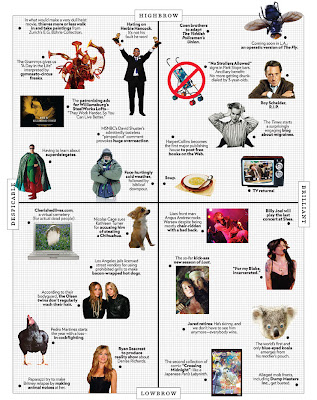
I hope to read some Agatha Christie in 2012.